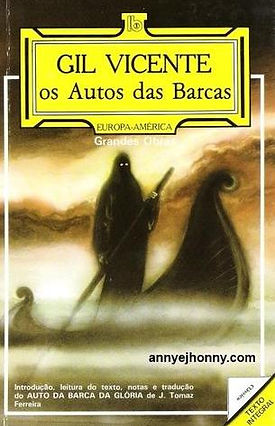A Trilogia das Barcas
A Trilogia das Barcas (The Trilogy of the Ferries or The Trilogy of Ships, in English) is a series of one-act dramatic plays with allegorical characters by Portuguese playwright and poet Gil Vicente. Specialists classify them as morality plays even though they resemble more closely farces. They give a glimpse of the Lisboan society in the early 16th century.
The play takes place in an imaginary port where two ferries await for their passengers. Each character argues with the Devil and the Angel about which ship they deserve to board. There is a pattern in which every character heads first to the Ship of Hell (which is more richly decorated), realize that this boat goes to Hell and then go to the Ship of Heaven. The characters that are not admitted in this boat, return to the Ship of Hell.
At the end only the four knights board the Ship of Heaven. All the other characters go to hell. To the Jew who refuses to give up his earthly possessions - a goat - is denied entrance even on the Ship of Hell (a rope is thrown to him and he is dragged in the water). The fool remains in the port, what is meant to say that he is a common and humble man but still has sins to atone. He helps the angel to judge the other characters and acts like a second voice to the author. His fate is not shown.
Three kinds of humour are present on the play:
humour from the character's demeanor, specially the Fool's.
situational humour (for instance, when the nobleman is mocked and humbled by the devil).
linguistic (several of the devil's lines are comic).
There are several allusions to the mythological Charon. For instance, the usurer claims to not have money to pay the ferryman's fee.

